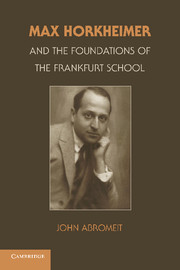Book contents
- Frontmatter
- Contents
- Acknowledgments
- A Note on References and Permissions
- Introduction
- 1 Coming of Age in Wilhelmine Germany
- 2 Student Years in Frankfurt
- 3 A Materialist Interpretation of the History of Modern Philosophy
- 4 The Beginnings of a Critical Theory of Contemporary Society
- 5 Horkheimer’s Integration of Psychoanalysis into His Theory of Contemporary Society
- 6 Horkheimer’s Concept of Materialism in the Early 1930s
- 7 The Anthropology of the Bourgeois Epoch
- 8 Reflections on Dialectical Logic in the Mid-1930s
- Excursus I The Theoretical Foundations of Horkheimer’s Split with Erich Fromm in the Late 1930s
- Excursus II Divergence, Estrangement, and Gradual Rapprochement
- 9 State Capitalism – The End of Horkheimer’s Early Critical Theory
- Epilogue
- Selected Bibliography
- Index
- References
6 - Horkheimer’s Concept of Materialism in the Early 1930s
Published online by Cambridge University Press: 05 June 2012
- Frontmatter
- Contents
- Acknowledgments
- A Note on References and Permissions
- Introduction
- 1 Coming of Age in Wilhelmine Germany
- 2 Student Years in Frankfurt
- 3 A Materialist Interpretation of the History of Modern Philosophy
- 4 The Beginnings of a Critical Theory of Contemporary Society
- 5 Horkheimer’s Integration of Psychoanalysis into His Theory of Contemporary Society
- 6 Horkheimer’s Concept of Materialism in the Early 1930s
- 7 The Anthropology of the Bourgeois Epoch
- 8 Reflections on Dialectical Logic in the Mid-1930s
- Excursus I The Theoretical Foundations of Horkheimer’s Split with Erich Fromm in the Late 1930s
- Excursus II Divergence, Estrangement, and Gradual Rapprochement
- 9 State Capitalism – The End of Horkheimer’s Early Critical Theory
- Epilogue
- Selected Bibliography
- Index
- References
Summary
The standpoint of the old materialism is bourgeois society; the standpoint of the new is human society, or socialised humanity.
Marx, Tenth Thesis on FeuerbachHaving completed our examination of the origins of Horkheimer’s Critical Theory in the period 1925–31, we turn now to its further development during the time when Horkheimer served as the director of the Institute and editor of its journal, the Zeitschrift für Sozialforschung. Whereas the previous three chapters were intended to demonstrate how Horkheimer moved beyond consciousness philosophy along two interrelated yet distinct axes – one diachronic and historical, the other synchronic and social – the following four chapters adopt a different approach to Horkheimer’s Critical Theory. Each chapter examines a particular concept that was essential to his Critical Theory during a particular time. Through an examination of these key concepts – materialism (Chapter 6), the anthropology of the bourgeois epoch (Chapter 7), dialectical logic (Chapter 8), and state capitalism (Chapter 9) – the overall development and transformation of Horkheimer’s Critical Theory in the period between 1931 and 1941 should become clear. Despite this change of approach, the continuities in Horkheimer’s work in the periods before and after 1931 are much greater than those between his work before and after approximately 1940. After becoming director of the Institute, Horkheimer tested, refined, and developed his Critical Theory. However, a qualitative shift in his Critical Theory did not occur until the late 1930s, when he broke with Erich Fromm, began working more closely with Theodor W. Adorno, and adopted a modified version of Friedrich Pollock’s state capitalism thesis. Thus, while Chapter 9 pursues the same methodological approach as Chapters 6, 7, and 8, thematically it belongs to a separate section of the study that, along with the two excursuses that examine Horkheimer’s changing relations with Fromm and Adorno, address the transformation of Horkheimer’s early Critical Theory into something qualitatively different.
Materialism and Metaphysics
In the essays “Materialism and Metaphysics” and “Materialism and Morality,” both published in the Zeitschrift für Sozialforschung in 1933, Horkheimer examined the relationship of contemporary materialism to a wide range of philosophical schools, from metaphysics and idealism to nominalism and positivism, and also to older forms of materialism itself. Horkheimer developed his own concept of materialism through a series of determinate negations of each of these various historical schools and/or philosophical concepts. He demonstrated in each case which aspects of these schools a concept of materialism adequate to contemporary socio-historical conditions should preserve and which it should negate. In what follows, we will briefly reconstruct Horkheimer’s analysis of the relationship of materialism to these various schools in order to clarify his own concept of materialism, which served as the philosophical foundation of his Critical Theory at this time.
- Type
- Chapter
- Information
- Max Horkheimer and the Foundations of the Frankfurt School , pp. 227 - 247Publisher: Cambridge University PressPrint publication year: 2011



